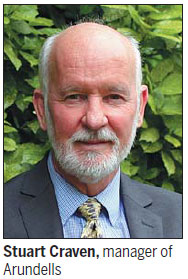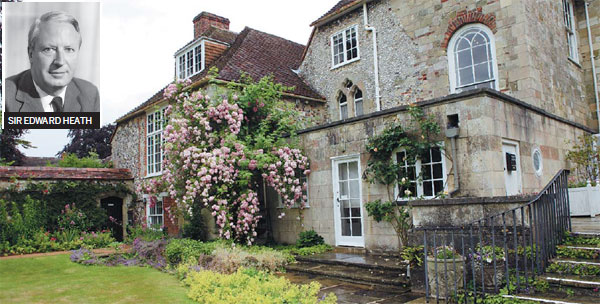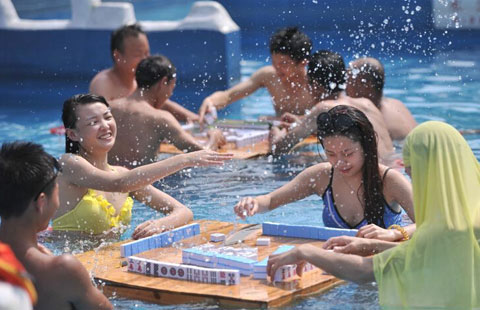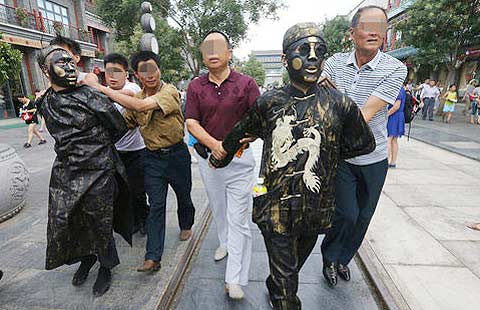The British PM who loved China
Updated: 2014-07-25 06:14
By Cecily Liu (China Daily Europe)
|
|||||||||||
|
From left: Heath's music room; Jade birds Heath bought from Friendship Store in Beijing; Journey to the West wallpaper. |
|
Sir Edward Heath brought back many objects to the house, Arundells, to remind him of China. Photos by Cecily Liu / China Daily |
The former home of Sir Edward Heath is a treasure trove of Chinese artifacts
Britons and visitors to the country now have the opportunity to visit the former home of Sir Edward Heath, the prime minister who famously was instrumental in establishing full diplomatic relationship between the UK and China in the 1970s.
Heath visited China on nearly 30 occasions throughout his political career and developed warm friendships with many Chinese leaders including the late Mao Zedong, Zhou Enlai and Deng Xiaoping.
He is said to have loved China greatly and brought back many objects to the house, Arundells, to remind him of the country.
When he died in 2005 aged 89, the house was vested into a charitable trust, the Sir Edward Heath Foundation.
It first opened to the public in 2008, in accordance with Heath's will, but later had to close as the foundation ran into financial difficulties.
But it is now reopened with funding from Peter Batey, who worked as parliamentary private secretary to Heath from 1982 to 1986.
In 1986 Batey moved to Beijing to help establish the accounting firm Arthur Andersen's presence in the capital, and has worked in China in various roles since.
He accompanied Heath on many of his China visits and recalls that the former PM had always greatly enjoyed his time in China.
"The twin passions of his political life were Europe and China. He had taken Britain into the European Economic Community, which is now the European Union. Heath's government established full diplomatic relationship between the UK and China in 1972."

Batey says Heath had very good personal relationships with those Chinese leaders, and he often talked to them for several hours at a time, discussing a wide range of major strategic international and domestic issues.
"They just talked. At the end of some of their meetings we were supposed to be having lunch, but they would go in at 10 am with the aim of finishing at 10.30 am, but by 12.30 pm we were often left wondering how much longer they might take," he says.
Heath was born in July 1916 in Kent, in Southeast England. He was from a humble background, the son of a carpenter and a lady's maid, who won a scholarship to study at Oxford University and subsequently served in World War II.
He developed an interest and passion for politics while at university, and was elected to Westminster in 1950 as the MP for Bexley.
After working his way up through the ranks of the Conservative party, he became Lord Privy Seal in 1960 under prime minister Harold Macmillan with responsibility for the negotiations to secure the UK's first attempt to join the Common Market, later to become the European Community.
Under prime minister Alec Douglas-Home, Heath was president of the board of trade and secretary of state for industry, trade and regional development and after Home's defeat in the 1964 general election, Heath who was then appointed shadow chancellor - unexpectedly won the party's leadership contest, becoming its youngest leader.
Heath became prime minister in 1970 and lasted four years, until 1974, when he lost out eventually to Labour leader Harold Wilson.
In addition to a political career, Heath was a yachtsman of international standing and an accomplished musician.
He captained the victorious British Admiral's Cup team in 1971 while serving as PM. He had played the piano from the age of seven, and eventually conducted major orchestras, in Europe, the US, and in China.
Heath paid a total of 26 visits to China over a period of 27 years, the first in 1974 when he met Mao and Deng.
Batey says Heath's 1974 visit to China was warmly received by Mao.
Mao watched his arrival at the airport on television and asked Zhou why Heath was not received with a ceremony fit for a foreign head of state.
"Premier Zhou replied that the reason was because Mr Heath was no longer the British prime minister, after Harold Wilson had won the 1974 election.
"But Chairman Mao told Premier Zhou that Mr Heath must be given the same treatment as a foreign head of state when he left the country," Batey says.
So when Heath left China during that trip, Mao gave him two giant pandas to bring back to the London Zoo - Chia Chia and Ching Ching - a prized gift fit for a departing head of state.
Establishing a good relationship with China was important especially for Heath, given the Cold War context at the time, and also because Hong Kong was due to be handed over to China in 25 years.
Economic opportunities between China and the UK could also have been a driving force, adds Batey.
But at the same time, Heath also had a genuine interest in China and Chinese culture, and developed a personal relationship with h Chinese leaders.
"There was a bit of personal chemistry. He had frank exchanges on the world with Mao and Deng. They enjoyed each other's company," Batey says.
"He may not have agreed with everything China did, but he didn't feel it was his place to comment and disagree with things. All the disagreements took place politely, conducted on the basis of mutual respect," Batey says.
He says one reason could have been that all of Heath's visits to China were conducted in his capacity as former prime minister, therefore there was no pressure for him to publicly disagree with China's domestic and international issues.
"If you are in government, you have to take the party line, but as a former prime minister, there is no obligation to do that," Batey says.
As a man with so many interests, Heath's time in China was not strictly spent on talking politics.
In 1987, he famously conducted the Central Philharmonic Symphony Orchestra of China at a charity concert in The Great Hall of the People to raise funds for the China Welfare Fund for the Handicaped.
Heath was guest conductor for Edgar's Cockaigne Overture, Tchaikovsky's Variations, and Dvorak's New World Symphony No. 9.
He also played Chinese songs on the piano accompanied by a group of handicapped musicians playing traditional Chinese instruments.
The concert was attended by several thousand people, both Chinese residents and foreign expats, including many foreign ambassadors.
It raised millions of pounds, with the purpose of building a new center for blind people in Beijing, Batey says.
He recalls that Deng told Heath the next day that he watched the performance on television and thought it was very well done.
Deng then said jokingly that the concert went on too long, because it had forced China's Central Television to delay its news broadcast, Batey recalls.
As an accomplished musician, Heath was also fascinated by Chinese musical instruments, and wanted to learn as much as he could about them during his Chinese visits, Batey says.
Although no one knew exactly why Heath was fascinated by China, one possibility could have been the influence of another of his former political private secretaries, Douglas Hurd, who would later have spells as both the UK's foreign secretary and home secretary.
Hurd, who accompanied Heath on his first China visit in 1974, had previously worked at the British charge d'affaires office in Beijing.
Due to Heath's long-standing friendship with China, there are now many traces of this relationship left in Arundells for visitors to see.
On his grand piano in the drawing room, for instance, is a collection of photographs, including ones showing him with Deng and Zhou.
In the same room on a shelf are two porcelain vases from the Qianlong Emperor period (1711-1799), which Mao gave to him as gifts in 1974.
Beside the shelf on a mantelpiece are also two jade birds, which Heath bought from the famous Friendship Store in Beijing in the 1980s.
Founded in the 1950s, the state-run store was initially designed to sell exclusively to tourists, foreigners, diplomats and government officials.
It still exists nowadays but has no restrictions on customers.
The wall next to the house's staircase is decorated with wallpaper illustrating the famous story Journey to the West, a Chinese novel published in the 16th century, documenting the legendary pilgrimage of the Tang Dynasty Buddhist monk Xuanzang who traveled to India to obtain sacred texts.
The wallpaper was given to Heath as a gift from Batey and Richard Burn, the former head of Heath's private office.
The scenes specifically focused on a monkey, who is a charismatic and troublesome follower of Xuanzang, but arguably the story's protagonist and most likable character.
In Heath's dining room, which he used to entertain many Chinese ambassadors to the UK, is a Tang Dynasty bull, which Batey also gave to the former premier as a present.
In the library, meanwhile, is a drinks table featuring many of his favorites, and Batey says Heath always had a bottle of Maotai - the famous, high-strength brand of Chinese spirit baijiu - available when the room was in use.
Also in Heath's study is a Ming Dynasty bowl which he bought in 1969 after he won the Sydney-Hobart race, one of the world's greatest ocean races.
The bowl was actually bought in Vietnam, but was cracked on the way home, and subsequently restored.
Beyond the numerous Chinese references, the fascinating world of Arundells gives visitors a full and insightful glimpse into both the life of Heath, as well as that of the British countryside.
The beautiful Georgian House, next door to the famous Salisbury Cathedral, in Wiltshire, Southwest England, takes its name from its previous owners.
Heath moved there in 1985, and stayed for the last 20 years of his life.
Today the museum is managed by Stuart Craven, who arrived at Arundells in 1985 to help redesign its two-acre gardens.
After the garden were finished, Heath asked Craven to stay and help him manage the house, which Craven agreed and he has stayed ever since.
Craven describes Heath as a unique person, and adds how unusual it was for a British prime minister to have so many interests and hobbies.
"It was very rare and I don't think it would happen now," Craven says, adding that Heath's interests and talents certainly helped him in his job.
"To function as a prime minister, you need another side of you to make you interested in the outside world," adds Craven, "and for Sir Edward this came from music and sailing."
cecily.liu@chinadaily.com.cn
(China Daily European Weekly 07/25/2014 page28)
Today's Top News
TransAsia crash while landing in Taiwan
UK fraud office liaising with China on GSK bribery case
Death toll in Gaza mounts to 701
Meat supplier in global crisis
Dogs 'capable' of feeling jealousy
Five detained over stale meat scandal
5 more universities set up human rights centers
Rebels likely downed jet 'by mistake'
Hot Topics
Lunar probe , China growth forecasts, Emission rules get tougher, China seen through 'colored lens', International board,
Editor's Picks

|

|

|

|

|

|







